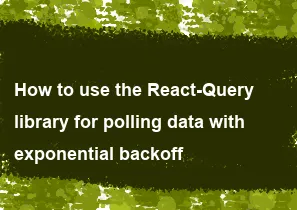How to use the React-Query library for polling data with exponential backoff

To use the React-Query library for polling data with exponential backoff, you can utilize the useQuery hook along with the staleTime and retry options. Here's how you can achieve this:
- Install React-Query: If you haven't already, install React-Query in your project.
bashnpm install react-query
- Set Up Your Query: Define your query function using the
useQueryhook. Configure thestaleTimeoption to control how often the data should be considered stale, and set up theretryoption to handle retries with exponential backoff.
javascriptimport { useQuery } from 'react-query';
const fetchData = async () => {
const response = await fetch('https://api.example.com/data');
if (!response.ok) {
throw new Error('Network response was not ok');
}
return response.json();
};
const MyComponent = () => {
const { data, error, isLoading, isError } = useQuery('myData', fetchData, {
staleTime: 30000, // 30 seconds
retry: (failureCount, error) => {
// Implement exponential backoff
return Math.min(2 ** failureCount * 1000, 30000); // Max interval 30 seconds
},
});
if (isLoading) return <div>Loading...</div>;
if (isError) return <div>Error: {error.message}</div>;
return (
<div>
{/* Render your data */}
</div>
);
};
In this example:
- The
fetchDatafunction fetches data from an API endpoint. - The
useQueryhook is used to fetch and manage the data. It accepts a query key ('myData'), the query function (fetchData), and options. - The
staleTimeoption determines how long the data remains fresh before it's refetched. Here, it's set to 30 seconds. - The
retryoption defines a retry function that implements exponential backoff. The function receives the failure count and error object as arguments and returns the delay in milliseconds before the next retry.
- Use the Data in Your Component: Render the data in your component once it's available.
With this setup, React-Query will handle polling the data with exponential backoff, ensuring that it retries fetching the data with progressively longer intervals in case of failures. This helps prevent overloading the server with frequent requests and improves the resilience of your application.
-
Popular Post
- How to optimize for Google's About This Result feature for local businesses
- How to implement multi-language support in an Express.js application
- How to handle and optimize for changes in mobile search behavior
- How to handle CORS in a Node.js application
- How to use Vue.js with a UI framework (e.g., Vuetify, Element UI)
- How to configure Laravel Telescope for monitoring and profiling API requests
- How to create a command-line tool using the Commander.js library in Node.js
- How to implement code splitting in a React.js application
- How to use the AWS SDK for Node.js to interact with various AWS services
- How to use the Node.js Stream API for efficient data processing
- How to implement a cookie parser middleware in Node.js
- How to implement WebSockets for real-time communication in React
-
Latest Post
- How to implement a dynamic form with dynamic field styling based on user input in Next.js
- How to create a custom hook for handling user interactions with the browser's device motion in Next.js
- How to create a custom hook for handling user interactions with the browser's battery status in Next.js
- How to implement a dynamic form with dynamic field visibility based on user input in Next.js
- How to implement a dynamic form with real-time collaboration features in Next.js
- How to create a custom hook for handling user interactions with the browser's media devices in Next.js
- How to use the useSWRInfinite hook for paginating data with a custom loading indicator in Next.js
- How to create a custom hook for handling user interactions with the browser's network status in Next.js
- How to create a custom hook for handling user interactions with the browser's location in Next.js
- How to implement a dynamic form with multi-language support in Next.js
- How to create a custom hook for handling user interactions with the browser's ambient light sensor in Next.js
- How to use the useHover hook for creating interactive image zoom effects in Next.js